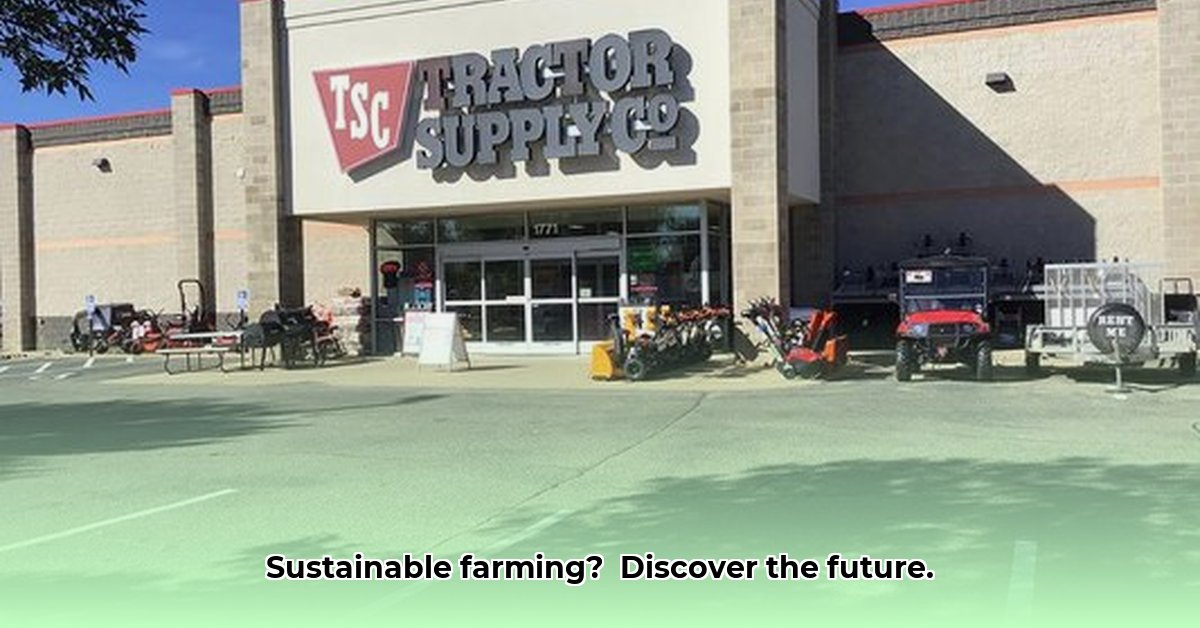
Sutherlin Tractor Supply (STS) plays a significant role in the agricultural landscape of Sutherlin, Oregon, providing farmers and gardeners with essential supplies. However, its contribution to sustainable farming practices requires a nuanced evaluation, encompassing both positive and negative aspects. This article examines STS's impact, highlighting opportunities for improvement and outlining actionable steps for a more sustainable future. For more information on STS, visit their website: Sutherlin Tractor Supply.
Access to Supplies: Convenience and Concerns
STS offers a wide array of agricultural products in a single location, a significant convenience for local farmers, saving them time and fuel. This ease of access is a considerable advantage for those adopting sustainable farming practices (e.g., minimizing transportation emissions). However, the sustainability of the products themselves remains a key question. The environmental impact of packaging, the sourcing of fertilizers and pesticides, and the origins of animal feed require further scrutiny. A comprehensive assessment of STS's supply chain is necessary to gauge its true contribution to environmental sustainability. How much of their product line is truly sustainable?
Expert Advice: Valuable Guidance, Yet Limited Scope
A strong point of STS is its knowledgeable staff. Many employees possess agricultural expertise and provide farmers with valuable advice on sustainable farming techniques. This personalized guidance is invaluable, facilitating the adoption of eco-friendly practices. For example, recommending water-saving irrigation methods or less-intensive fertilizers can significantly reduce environmental impact. However, the extent and consistency of this expert advice across all staff members need to be evaluated. Does every staff member have the same level of awareness regarding sustainable practices?
Transparency and Data: The Need for Accountability
A significant shortcoming is the lack of readily available data on STS's own sustainability initiatives. Information on waste reduction, energy consumption within the store, and the overall environmental footprint of its operations is limited. This lack of transparency hinders an objective assessment of STS's complete contribution to sustainability. A data-driven approach is crucial for credible evaluation, allowing for specific measurements of progress and targeted improvements. What is STS doing to actively reduce its carbon footprint?
Moving Forward: Actionable Steps for Greener Practices
Genuine sustainability requires proactive engagement from all stakeholders, including STS itself, local farmers, and the local government. Here's a roadmap for more sustainable practices:
For Sutherlin Tractor Supply:
Year 1: Conduct customer surveys to gauge interest in sustainable products. Implement educational workshops on eco-friendly farming techniques. Analyze the environmental impact of all products, tracing their supply chains and reviewing packaging materials. Aim for a 20% reduction in single-use plastics within the next year.
Years 3-5: Prioritize the sourcing of truly sustainable products, including organic seeds, locally produced compost, and sustainably sourced animal feed. Introduce aggressive waste reduction and recycling programs. Establish partnerships with local agricultural organizations to expand outreach and educational efforts. Target a 50% increase in sustainable product offerings.
For Local Farmers and Gardeners:
Year 1: Utilize the expertise of STS staff to make informed purchasing decisions. Actively participate in workshops and educational programs. Demand a wider selection of sustainable products from STS.
Years 3-5: Share sustainable agricultural best practices within the farming community. Explore cooperative purchasing of sustainable products to leverage collective buying power and encourage wider adoption by STS.
For Local Government:
Year 1: Partner with STS to create incentives for adopting sustainable farming practices. Promote STS's role in local sustainability initiatives.
Years 3-5: Implement local regulations that support sustainable agriculture and local businesses, such as zoning changes or tax incentives for eco-friendly practices.
A Partnership for Progress: Realizing Sustainability's Potential
Sutherlin Tractor Supply's potential to positively influence sustainable agriculture in the region is considerable. However, realizing this potential rests on transparency, data-driven improvements, and collaborative effort. By embracing a proactive and data-informed approach, STS can become a key driver of sustainable agricultural practices in Sutherlin, creating positive long-term impacts for the community and the environment. The increased consumer demand for sustainable practices presents a substantial opportunity for all involved. What concrete steps will be taken to ensure this positive trajectory?